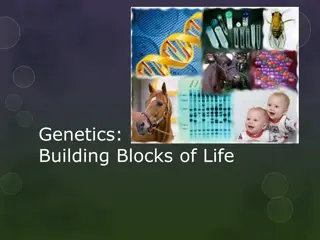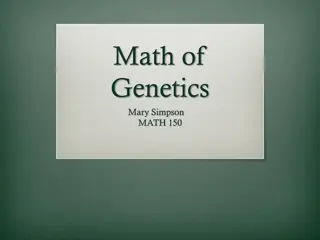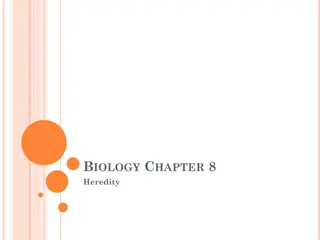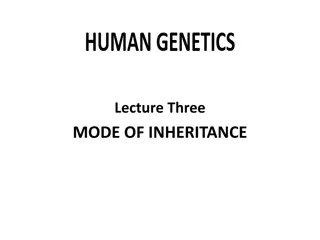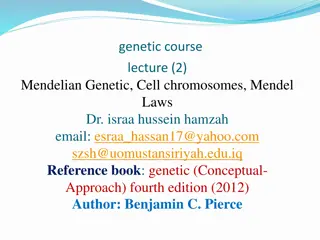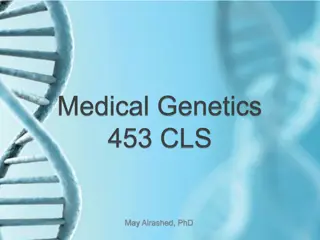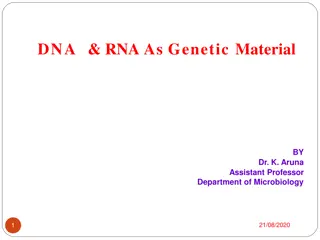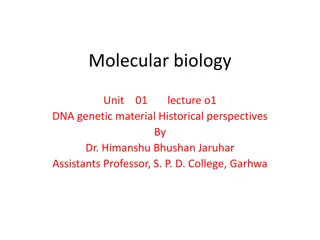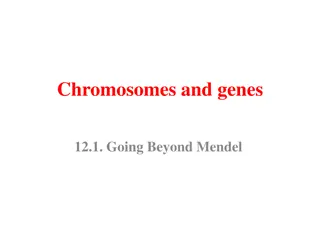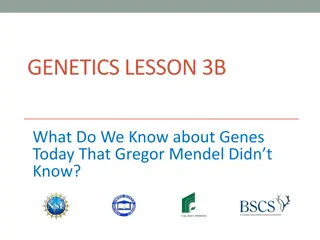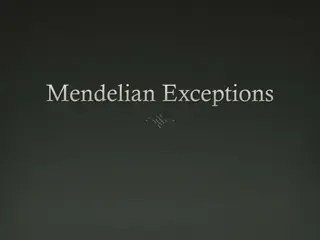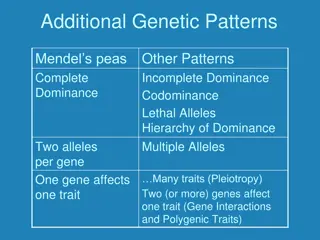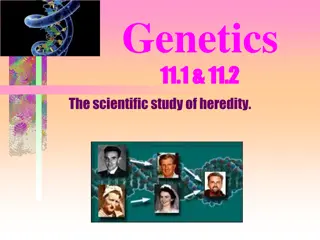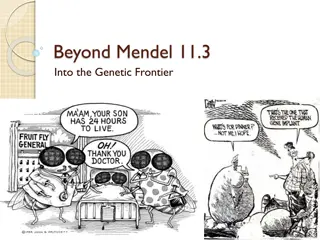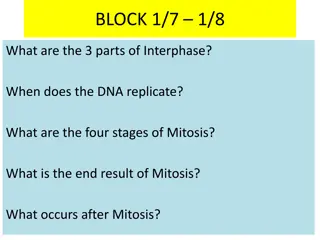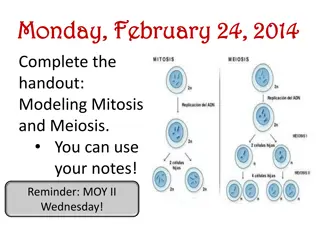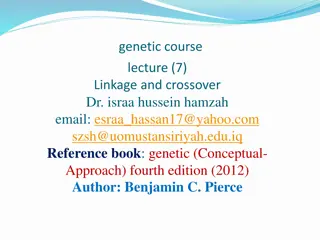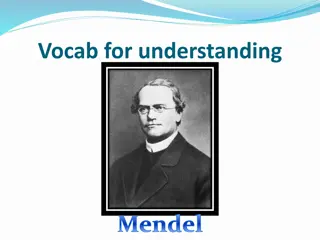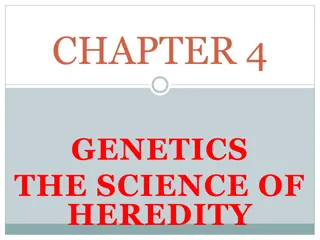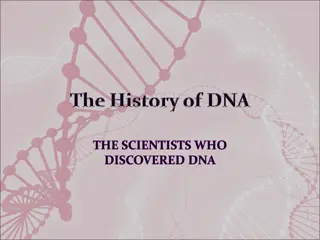Genetics: The Blueprint of Life
Genetics is the study of heredity and how traits are passed from parents to offspring. It involves understanding genetic makeup (genotype) and physical attributes (phenotype) determined by genes. Mendel's laws of segregation and independent assortment explain how alleles and traits are inherited. Nu
0 views • 34 slides
Exploring the Basics of Genetics and Inheritance
Understanding the fundamentals of genetics and inheritance, this content covers topics such as Mendelian genetics, gene inheritance, chromosomes, alleles, and Gregor Mendel's pioneering work. It delves into genetic outcomes related to multiple traits, linkage, dominance, Hardy-Weinberg equations, an
0 views • 87 slides
Understanding Mendel's Experiments and Principles of Genetics
Delve into the pioneering work of Gregor Mendel, the father of genetics, as he conducted groundbreaking experiments with pea plants, identified key principles of genetics, and introduced the concept of dominant and recessive traits. Explore how Mendel's work laid the foundation for our understanding
4 views • 23 slides
Exploring the Legacy of Gregor Mendel: Pioneer of Genetics
Gregor Mendel, an Austrian monk, revolutionized the understanding of heredity with his formulation of fundamental laws in the 1860s. Contrary to the prevailing blending theory of inheritance, Mendel's particulate theory explained species diversity and variation effectively. By meticulously conductin
2 views • 20 slides
Understanding Modes of Inheritance According to Mendel's Laws
Explore the fundamentals of genetics by assessing Mendel's laws of inheritance, understanding Mendelian inheritance bases, and defining various patterns of single-gene inheritance using family pedigrees and Punnett squares. Dive into the fascinating world of genotypes, Punnett squares, and laws of d
0 views • 29 slides
Mendelian Inheritance and the Rediscovery of Mendel's Work
Mendelian inheritance, based on Gregor Mendel's laws proposed in the 19th century, laid the groundwork for modern genetics. Despite initial neglect, Mendel's work was rediscovered in 1900 after notable developments in biology. This historical overview highlights Mendel's contributions and the journe
0 views • 21 slides
Evolutionary Contributions of Prominent Scientists in the 19th Century
Charles Darwin, Gregor Mendel, Friedrich Miescher, Aristotle, and Carl Linnaeus were key figures in the 19th century who made significant contributions to the fields of evolution, genetics, DNA discovery, and taxonomy. Darwin proposed the theory of evolution and natural selection, Mendel established
0 views • 20 slides
Understanding DNA and RNA as Genetic Material
Genetic material plays a crucial role in the transmission of traits from one generation to the next. This article explores the significance of DNA and RNA as genetic material, highlighting key experiments and discoveries that demonstrate DNA's role in carrying hereditary information. From Mendel's h
0 views • 32 slides
Historical Perspectives on DNA as Genetic Material: From Mendelism to Griffith's Experiment
Mendelism's rediscovery in 1900 laid the groundwork for understanding heredity, leading to the association of Mendel's factors with chromosomes. The quest to identify the chemical nature of heredity began with Friedrich Miescher's discovery of nucleic acid in 1869. Despite initial confusion between
0 views • 16 slides
Understanding Punnett Squares and Genetic Crosses
Explore the world of genetics through Punnett squares and genetic crosses, where traits like eye color are predicted using Mendel's principles. Discover the laws of dominance, segregation, and how to determine genotype and phenotype ratios in offspring.
0 views • 23 slides
Understanding Genetic Inheritance: Going Beyond Mendel
Exploring genetic inheritance beyond Mendel's principles, this content delves into topics like incomplete dominance, codominance, pleiotropy, epistasis, and multiple alleles. Discover how genes interact to shape phenotypes and learn about interesting genetic phenomena like Marfan syndrome and the AB
0 views • 20 slides
Understanding Modern Genetics Beyond Mendelian Principles
Exploring the evolution of genetic knowledge, this lesson compares Mendel's theories with contemporary insights. Students analyze genes, chromosomes, and inheritance mechanisms to comprehend why individuals of a species exhibit variations. By delving into Sutton's concepts and discussing scientific
0 views • 7 slides
Understanding Mendelian Genetics Exceptions
Explore the exceptions to Mendel's laws including incomplete dominance, codominance, and multiple alleles with detailed explanations and illustrative examples. Learn how these variations impact the inheritance of traits and genetic expressions in organisms.
0 views • 43 slides
Exploring the Legacy of Gregor Mendel: Pioneer of Genetics
Gregor Mendel, a father monk in the 1800s, conducted groundbreaking research on how traits are inherited through plants, laying the foundation for modern genetics. Despite initial lack of recognition, his work on pea plants led to the discovery of genetic factors and the understanding of hereditary
0 views • 43 slides
Understanding Genetic Patterns Beyond Mendel's Peas
Explore additional genetic patterns such as incomplete dominance, codominance, multiple alleles, and unique inheritance mechanisms like sex-influenced traits and cytoplasmic inheritance. Discover how genes interact to influence traits beyond Mendel's classic experiments, shedding light on the comple
0 views • 38 slides
Understanding Genetics: The Study of Heredity and Mendel's Discoveries
Explore the fascinating world of genetics through the scientific study of heredity and the groundbreaking work of Gregor Mendel, the Father of Genetics. Learn about hereditary traits, the role of fertilization, Mendel's experiments with pea plants, and the concepts of genes and alleles that shape bi
0 views • 23 slides
The Legacy of Gregor Mendel: Father of Genetics and Pea Plant Experiments
Gregor Mendel, a monk from the 1800s, conducted groundbreaking experiments with pea plants to study inheritance patterns. By meticulously observing traits like seed color and pod shape, Mendel discovered the principles of heredity and laid the foundation for modern genetics. His work on dominant and
0 views • 33 slides
Understanding Genetic Inheritance Patterns and Human Blood Types
Explore how genes can be inherited based on patterns such as Mendel's dominance, incomplete dominance, co-dominance, and multiple alleles. Dive into the complexities of human blood types controlled by one gene with three alleles - A, B, and O, resulting in four phenotypes and six genotypes. Learn ho
0 views • 19 slides
Gregor Mendel and His Work with Pea Plants
Gregor Mendel, an Austrian monk born in 1822, is known as the father of genetics for his groundbreaking work with pea plants. By carefully examining traits such as stem height, flower color, and seed shape, Mendel discovered the principles of dominant and recessive alleles. His experiments with pea
0 views • 14 slides
Understanding Patterns of Inheritance and Genetic Disorders
Explore the fascinating world of patterns of inheritance through pedigrees, analyzing traits in humans, and understanding disorders determined by single genes. Delve into autosomal recessive diseases, autosomal dominant disorders, Mendel's assumptions, and exceptions to those assumptions. Discover p
0 views • 29 slides
Understanding the Basics of Genetics with Gregor Mendel
Fundamentals of genetics involve the study of how traits are passed from parents to offspring, as demonstrated by Gregor Mendel's experiments with garden peas. Through his work, Mendel identified key concepts such as purebred and hybrid traits, generations, and the role of dominant and recessive fac
0 views • 14 slides
Genetics and Cell Division Study Guide
Explore topics ranging from cell division phases, mitosis stages, genetic variation in sexual reproduction, chromosome structures, karyotypes, Mendel's laws, Punnett squares, and more in this comprehensive study guide. Understand key concepts such as DNA replication, chromosomal abnormalities, gamet
0 views • 46 slides
Understanding Genetics: Mendel's Experiments and Inheritance Patterns
Delve into the world of genetics through Mendel's groundbreaking experiments with pea plants, exploring traits inheritance, Punnett squares, dominant and recessive alleles, incomplete dominance, and co-dominance. Gain insights into how traits are passed from parents to offspring and predict offsprin
0 views • 9 slides
Understanding Linkage and Crossover in Genetics
Genes determining individual characteristics are carried in chromosomes, with some genes linked and inherited together. This linkage affects how genes assort in offspring, following principles of inheritance like Mendel's laws. The Chromosome Theory of Linkage explains how the distance between genes
0 views • 24 slides
Understanding Monohybrid Crosses in Genetics
Explore Mendel's monohybrid crosses using pea plants to study inheritance of specific characteristics, such as plant height. Learn about genetic principles like segregation and dominance through practical examples and Punnett squares.
0 views • 18 slides
Gregor Mendel: The Father of Genetics and His Pea Plant Experiments
Gregor Mendel, an Austrian botanist monk, laid the foundation for the study of heredity with his groundbreaking work on pea plants in the mid-1800s. By observing traits across generations, Mendel formulated the basic laws of genetics, demonstrating how traits are inherited. His experiments with pure
0 views • 18 slides
Understanding Mendel's Genetic Vocabulary
Explore essential genetic terms such as Trait, Gene, Allele, Genotype, Phenotype, Dominant Allele, Recessive Allele, Heterozygous, and Homozygous in the context of Mendel's groundbreaking work on inheritance patterns. Understanding these terms is crucial for comprehending how genetic traits are pass
0 views • 14 slides
Understanding Genetics: The Science of Heredity and Gregor Mendel's Contributions
Exploring the field of genetics, this chapter delves into how traits are inherited through genes. Known as the "Father of Genetics," Gregor Mendel's work on filial generations and alleles, both dominant and recessive, forms the basis of genetic research.
0 views • 61 slides
Understanding Mendel's Experiments: Crosses and Punnett Squares
Mendel's groundbreaking experiments with pea plants led to the discovery of genetic inheritance patterns involving dominant and recessive traits. Through detailed cross-breeding studies and the use of Punnett squares, Mendel demonstrated how traits are passed down from one generation to the next, pa
0 views • 17 slides
The Pioneers of Genetics: Mendel and the Discovery of DNA
Explore the groundbreaking work of Gregor Mendel, known as the Father of Genetics, who studied pea plants to uncover the principles of inheritance. Follow the journey from Mendel's observations and results to the identification of DNA as the material responsible for passing on inherited information
0 views • 13 slides
Understanding Chi-Squared Test in Genetics
Explore the Chi-Squared Test in genetics through practical examples such as Mendel's crosses and pea plant genotypes. Learn how to compare expected and observed data, analyze deviations, and test null hypotheses using statistical methods. Dive into the world of scientific hypothesis testing and make
0 views • 12 slides
